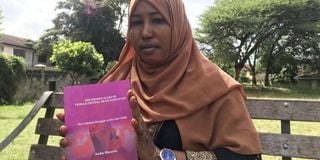Survivor speaks on the hidden scars of FGM

What you need to know:
- Ms Sadia Hussein was only 10 years old when her grandmother cut her under the watch of her mother.
- They had told her she would be “complete” upon undergoing the rite of passage.
- Her experience and that of other girls are the basis of her maiden book The hidden Scars of FGM.
- This book is meant to show the world the lifetime damages of FGM on girls and women.
- She says the religion corrupts women to think they are incomplete without the cut and hence seek to “complete” their daughters by forcefully cutting them.
At the age of 10, Ms Sadia Hussein's grandmother cut her under the watch of her mother at Gafuru, a small village in Galoleni Sub-county, Tana River County.
They had told her she would be “complete” upon undergoing the rite of passage.
The physical and psychological scars this act of female genital mutilation (FGM) has caused her, nevertheless defeats their philosophy.
Delivery of her three daughters caused her excruciating pain as a result. She delivered them at home with the assistance of a traditional birth attendant. In all the deliveries, she cut and sewed her already scarred genitalia.
ENDURED PAIN
She was tormented and her mother made it worse. She dismissed her when she reached out for psychological support.
“I asked her why all the pain and she told me ‘We all endured this pain. Are you different? You are just a coward’,” narrates the 33-year-old.
Her experience and that of other girls are the basis of her maiden book The hidden Scars of FGM.
“This book is meant to show the world the lifetime damages of FGM on girls and women,” she says.
“To make people feel the enduring pain hidden behind their beautiful smiles.”
The 50-page book gives insights to her own struggles after the cut, complexities of traditions and religion in ending the vice and recommendations thereto.
She delves into how Islamic religious beliefs entangle women and girls to FGM by brainwashing the women themselves to uphold the practice.
She says the religion corrupts women to think they are incomplete without the cut and hence seek to “complete” their daughters by forcefully cutting them.
TRAUMATIC EXPERIENCE
“But it is complete deception,” she says.
“No one will tell you about the pain you will go through when giving birth or the trauma that comes with the experience.”
She hopes her experience will trigger communities and duty bearers to work together towards ending the vice.
She argues that FGM is still rampant because “people don’t see it as an issue.”
“Globally 200 million girls and women are living with the scars of FGM but it’s still not taken seriously,” she says.
The book launched last month will retail at Sh2,000 in bookstores countrywide.
She believes her dream of freeing women and girls from FGM would become true if every member of the community personalises the fight against the vice.
“I will not rest till I see a society where women and girls are free to say “No” to FGM.”





